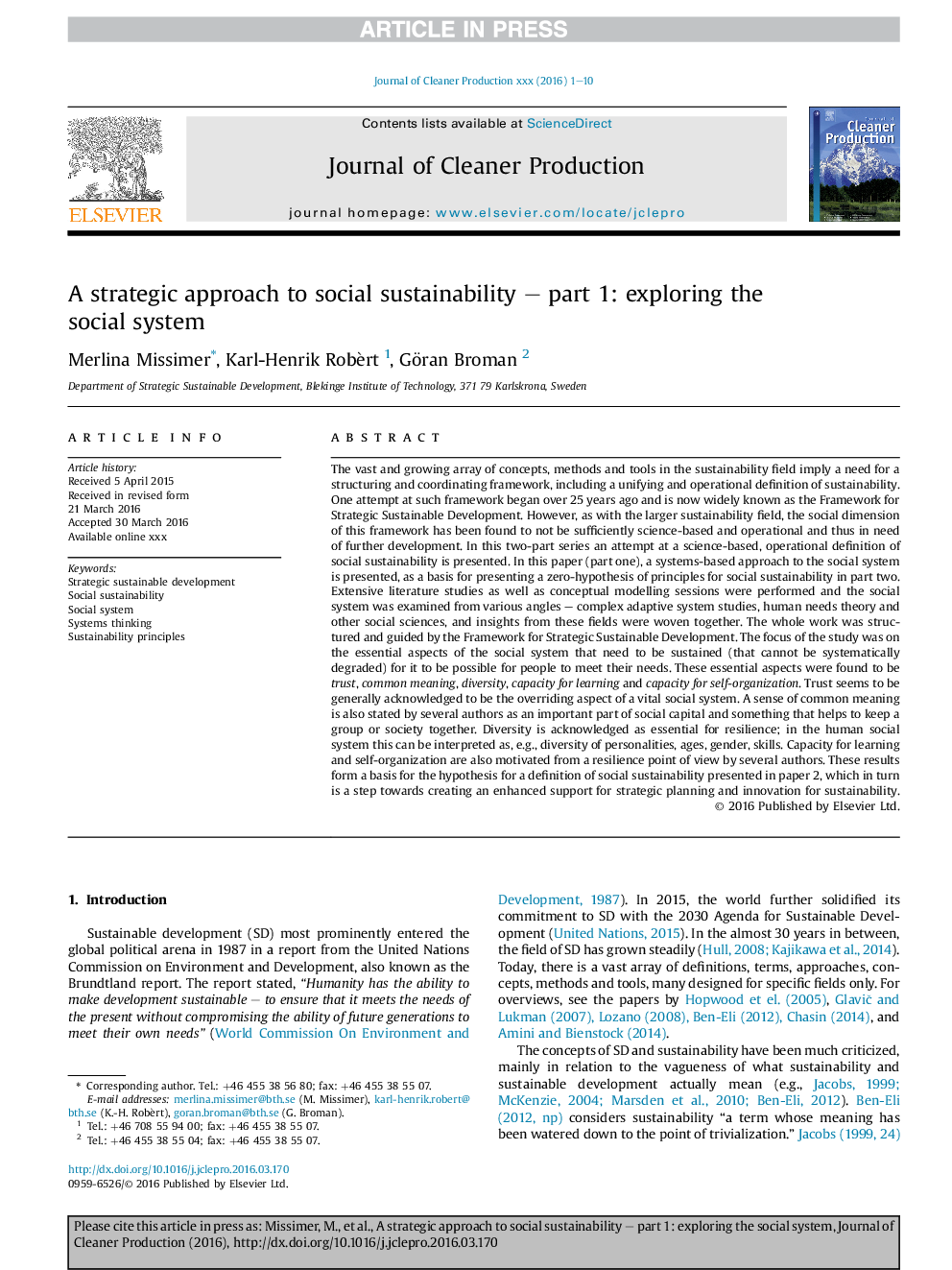| کد مقاله | کد نشریه | سال انتشار | مقاله انگلیسی | نسخه تمام متن |
|---|---|---|---|---|
| 5480633 | 1399320 | 2017 | 10 صفحه PDF | دانلود رایگان |
عنوان انگلیسی مقاله ISI
A strategic approach to social sustainability - Part 1: exploring the social system
ترجمه فارسی عنوان
یک رویکرد استراتژیک به پایداری اجتماعی - قسمت 1: بررسی سیستم اجتماعی
دانلود مقاله + سفارش ترجمه
دانلود مقاله ISI انگلیسی
رایگان برای ایرانیان
کلمات کلیدی
توسعه پایدار استراتژیک، پایداری اجتماعی، سیستم اجتماعی، تفکر سیستمی، اصول پایداری،
ترجمه چکیده
مجموعه وسیعی از مفاهیم، روشها و ابزارهای موجود در زمینه پایداری نیاز به یک چارچوب ساختار و هماهنگی دارد، از جمله تعریف یکپارچه و عملیاتی از پایداری. یک تلاش در چارچوب این چارچوب بیش از 25 سال پیش آغاز شده است و اکنون به عنوان چارچوب توسعه پایدار استراتژیک شناخته شده است. با این حال، همانطور که با زمینه پایداری بزرگتر، ابعاد اجتماعی این چارچوب مشخص شده است که به اندازه کافی مبتنی بر علم و عملیاتی نیست و بنابراین نیازمند توسعه بیشتر است. در این سری دو بخش تلاش برای تعریف پایدار علمی و عملی پایدار اجتماعی ارائه شده است. در این مقاله (قسمت اول) یک رویکرد مبتنی بر سیستم به سیستم اجتماعی ارائه شده است، به عنوان مبنایی برای ارائه یک فرضیه صفر از اصول پایداری اجتماعی در قسمت دوم ارائه شده است. مطالعات ادبی گسترده و همچنین جلسات مدل سازی مفهومی انجام شد و سیستم اجتماعی از زوایای مختلف - مطالعات سیستم سازگار پیچیده، نظریه نیازهای انسانی و سایر علوم اجتماعی بررسی شد و بینش از این زمینه ها با هم همخوانی داشت. تمام کارها توسط چارچوب توسعه پایدار استراتژیک سازمان یافته و هدایت شده است. تمرکز مطالعه بر جنبه های ضروری سیستم اجتماعی بود که باید پایدار باشد (که نمی تواند به طور سیستماتیک تخریب شود) برای اینکه مردم بتوانند نیازهای خود را برآورده سازند. این جنبه های اساسی به عنوان اعتماد، معنی مشترک، تنوع، ظرفیت یادگیری و ظرفیت سازمان خود شناخته شده اند. به نظر می رسد اعتماد به طور کلی به عنوان یکی از جنبه های مهم سیستم اجتماعی حیاتی شناخته شده است. معنای مشترک نیز توسط نویسندگان متعددی به عنوان بخش مهمی از سرمایه اجتماعی و چیزی که کمک می کند تا یک گروه یا جامعه را با هم همگام سازد، بیان می شود. تنوع برای انعطاف پذیری ضروری است؛ در سیستم اجتماعی انسانی این را می توان تفسیر کرد، به عنوان مثال، تنوع شخصیت ها، سنین، جنسیت، مهارت ها. ظرفیت یادگیری و خود-سازمان نیز از دیدگاه انعطاف پذیری چندین نویسنده انگیزه می گیرد. این نتایج پایه ای برای فرضیه تعریف پایداری اجتماعی ارائه شده در مقاله 2 است که به نوبه خود گام به سوی ایجاد حمایت بیشتر برای برنامه ریزی استراتژیک و نوآوری برای پایداری است.
موضوعات مرتبط
مهندسی و علوم پایه
مهندسی انرژی
انرژی های تجدید پذیر، توسعه پایدار و محیط زیست
چکیده انگلیسی
The vast and growing array of concepts, methods and tools in the sustainability field imply a need for a structuring and coordinating framework, including a unifying and operational definition of sustainability. One attempt at such framework began over 25 years ago and is now widely known as the Framework for Strategic Sustainable Development. However, as with the larger sustainability field, the social dimension of this framework has been found to not be sufficiently science-based and operational and thus in need of further development. In this two-part series an attempt at a science-based, operational definition of social sustainability is presented. In this paper (part one), a systems-based approach to the social system is presented, as a basis for presenting a zero-hypothesis of principles for social sustainability in part two. Extensive literature studies as well as conceptual modelling sessions were performed and the social system was examined from various angles - complex adaptive system studies, human needs theory and other social sciences, and insights from these fields were woven together. The whole work was structured and guided by the Framework for Strategic Sustainable Development. The focus of the study was on the essential aspects of the social system that need to be sustained (that cannot be systematically degraded) for it to be possible for people to meet their needs. These essential aspects were found to be trust, common meaning, diversity, capacity for learning and capacity for self-organization. Trust seems to be generally acknowledged to be the overriding aspect of a vital social system. A sense of common meaning is also stated by several authors as an important part of social capital and something that helps to keep a group or society together. Diversity is acknowledged as essential for resilience; in the human social system this can be interpreted as, e.g., diversity of personalities, ages, gender, skills. Capacity for learning and self-organization are also motivated from a resilience point of view by several authors. These results form a basis for the hypothesis for a definition of social sustainability presented in paper 2, which in turn is a step towards creating an enhanced support for strategic planning and innovation for sustainability.
ناشر
Database: Elsevier - ScienceDirect (ساینس دایرکت)
Journal: Journal of Cleaner Production - Volume 140, Part 1, 1 January 2017, Pages 32-41
Journal: Journal of Cleaner Production - Volume 140, Part 1, 1 January 2017, Pages 32-41
نویسندگان
Merlina Missimer, Karl-Henrik Robèrt, Göran Broman,
